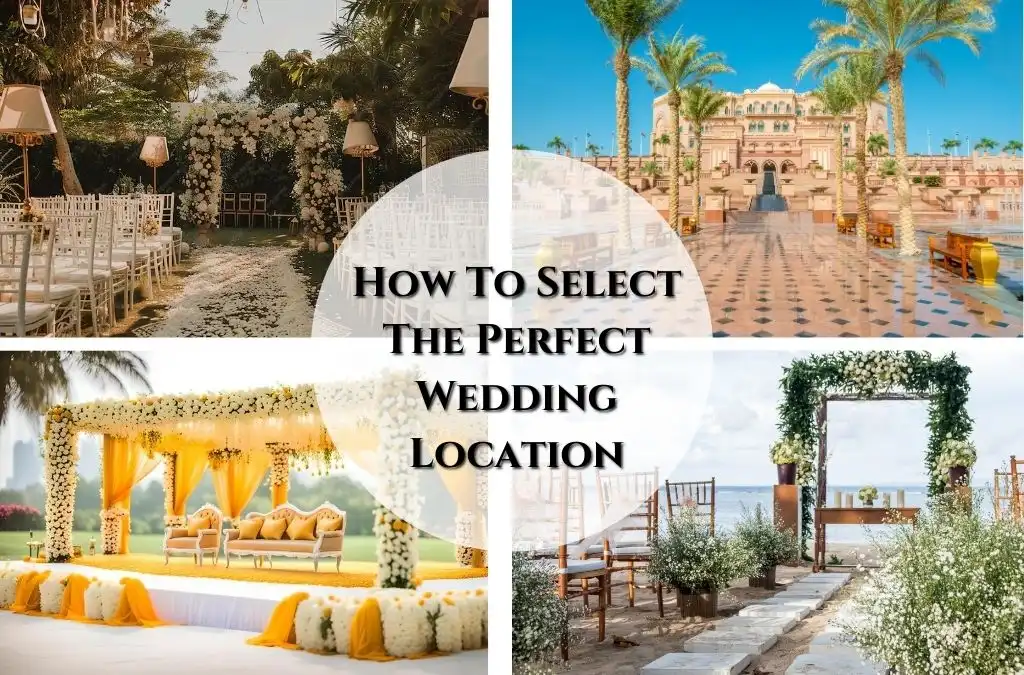1. Define Your Vision
The first step in choosing a wedding location is to have a clear idea of the kind of wedding you envision. Consider the following:
Style and Theme : Are you dreaming of a rustic barn wedding, a glamorous ballroom affair, a beachfront celebration, or an intimate garden gathering? Your choice of venue will be greatly influenced by your theme.
Guest List : The size of your guest list will determine the capacity required for your venue. An intimate ceremony might call for a smaller, cozy space, while a large celebration will need a more spacious location.
2. Establish Your Budget
A budget is an important consideration when making decisions. Venues can vary greatly in price, so it’s essential to have a clear budget in mind. Don’t forget to account for additional expenses like:
Venue Rental : This might be a flat fee or based on the number of guests.
Catering : While some venues let outside suppliers, others mandate that you use their in-house caterer.
Decor and Rentals : Consider the cost of transforming the space to match your vision, including items like chairs, tables, and lighting.
Additional Fees : Be aware of hidden costs such as service charges, taxes, and gratuities.
3. Location And Accessibility
Think about where your guests will be coming from and how accessible the venue is for them. Consider the following:
Proximity to Home : Is the venue close enough for most of your guests to travel to easily? If not, you might need to arrange accommodations.
Transportation : Is there ample parking, or will you need to provide transportation? Venues in remote locations might require shuttle services.
Accommodation : If you’re planning a destination wedding or have many out-of-town guests, ensure there are suitable accommodations nearby.
4. Visit Multiple Venues
Once you have a shortlist of potential venues, visit them in person. This allows you to:
Assess the Space : Ensure it fits your vision and can comfortably accommodate your guest list.
Check Facilities : Look at the kitchen facilities (if you’re hiring a caterer), restrooms, and any changing rooms for the bridal party.
Meet the Staff : Gauge the professionalism and helpfulness of the venue staff. They will play a significant role in the smooth running of your wedding day.
5. Consider The Venue’s Services
Different venues offer varying levels of service. Some might provide a full-service experience, including catering, decorations, and planning assistance, while others might simply rent the space. Consider:
In-house Services : Venues that offer catering, floral arrangements, and coordination can simplify the planning process.
Preferred Vendors : Some venues have a list of preferred vendors who are familiar with the space and its requirements.
Flexibility : If bringing in your own vendors is crucial to you, make sure the venue permits you to do so.
6. Evaluate The Ambiance And Setting
The ambiance of your wedding venue should align with the mood you want to create for your special day. Consider the following elements:
Natural Light : Venues with ample natural light can enhance your wedding photos and create a beautiful atmosphere.
Outdoor Space : If you’re planning an outdoor ceremony or reception, ensure the venue has well-maintained grounds and a backup plan for inclement weather.
Décor and Architecture : Consider how the existing décor and architecture of the venue align with your wedding theme. Some spaces might require minimal decoration, while others might need significant enhancements.
7. Weather Considerations
If you’re planning an outdoor wedding, the weather can be a critical factor. Consider the following:
Season : Choose a season that typically has favorable weather conditions for your location.
Backup Plan : Ensure the venue has an indoor option or tent available in case of bad weather.
Climate Control : For indoor venues, make sure they have adequate heating or cooling systems depending on the time of year.
8. Review The Contract Carefully
Before signing a contract, review it thoroughly. Pay attention to:
Cancellation Policy : Recognize the terms and restrictions pertaining to rescheduling and cancellations under the cancellation policy.
Payment Schedulevv : Ensure you are clear on the deposit and payment schedule to avoid any surprises.
Restrictions : Some venues have restrictions on things like noise levels, decorations, and end times for events.
9. Seek Recommendations
Speak with friends, family, and recently married couples to get their recommendations and insights. Making decisions based on personal experiences might help you make better decisions by supplying useful information.
10. Trust Your Instincts
Finally, trust your instincts. If a venue feels right and meets all your criteria, it’s likely the perfect choice for your wedding. Your venue should make you feel excited and confident about your special day.
Selecting the perfect wedding location requires careful consideration and planning, but with these tips, you can find a venue that perfectly matches your vision and ensures a memorable celebration.

